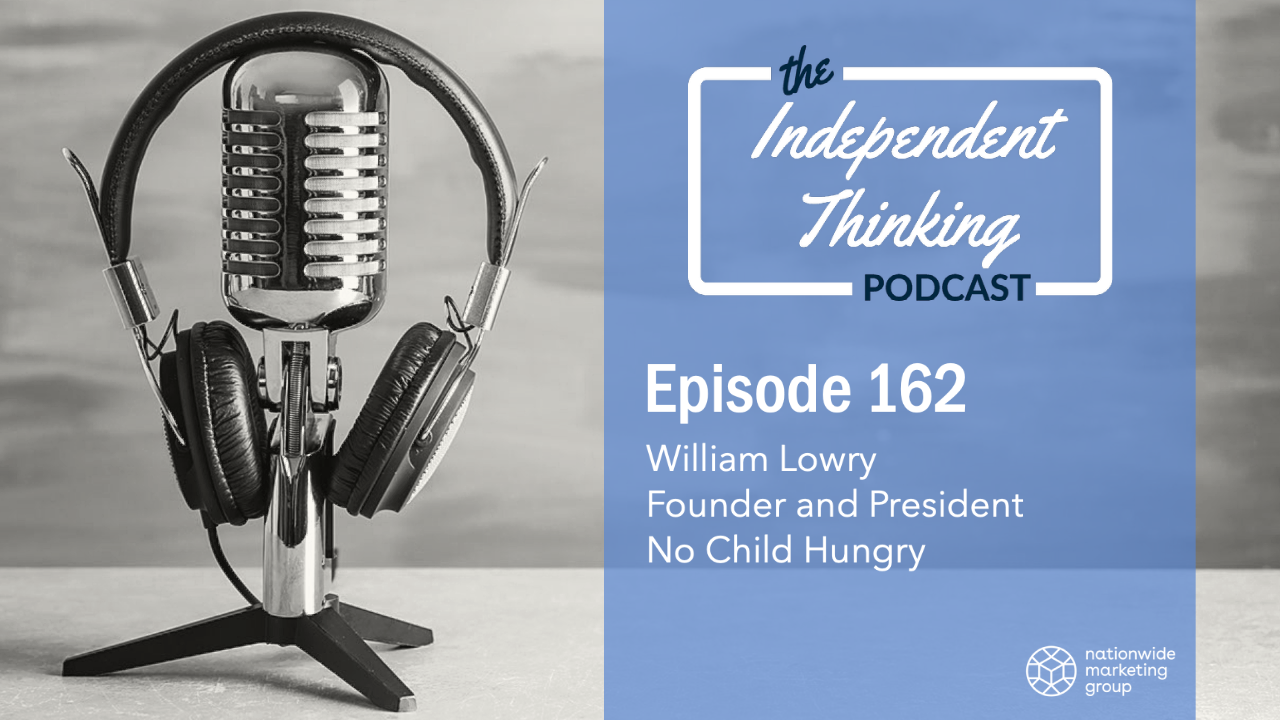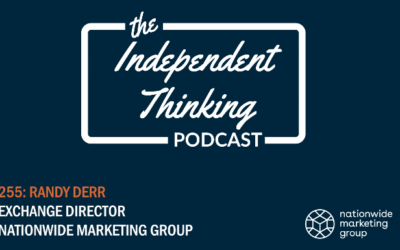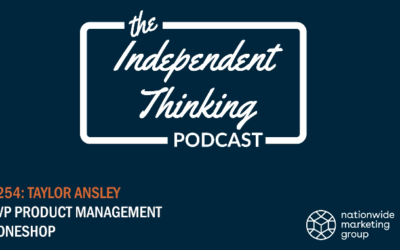Ahead of PrimeTime in Dallas, the Nationwide Marketing Group team, on behalf of Members attending the show, offered support for No Child Hungry and their efforts to get critical supplies to earthquake victims in Turkey and Syria. During the show, William Lowry, founder of No Child Hungry, was on hand to continue to raise awareness.
Interested in helping support those in need in Turkey and Syria? Visit the No Child Hungry website for information on how you can give back.
Rob Stott: All right, we are back on the Independent Thinking Podcast and what better way to do this podcast? I love doing them at home in the comfort of my office and with my Roadcaster Pro and headphones and everything, but love to be able to do it on the road at primetime and with the folks from No Child Hungry. William, appreciate you taking the time. A little bit of a different experience this year and we’ll get into that at this prime time, but appreciate you taking the time to chat with us.
William Lowry: Yeah, thank you. Thanks for having us. And we’re so happy to be back at primetime again. It’s become part of our year, a couple times a year and it’s so good to see everybody.
Rob Stott: Absolutely. And we’ll dive right into it, because for those that were at the general session yesterday, they heard our CEO, Tom Hickman, talk about how it looks a little different obviously, the efforts at this show. We wanted to still give back, but we felt coming off of the news of that 7.8 magnitude earthquake that hit Turkey and Syria, the need was great and it needed to happen more soon than us waiting to come to a prime time. So talk about, just before we dive into the specific effort here, your team’s response at No Child Hungary and kind of what you’re doing.
William Lowry: Yeah, so exciting year, first last year we passed 50 million meals, over 2 million done by Nationwide, which is really cool, and nationwide members throughout the country. When the earthquake hit in Turkey, I got a note from Melissa saying, are you doing anything? And we said, yes, we are. We’re going to be rolling out a three-phase approach. Having experienced the earthquake in Haiti back in 2010, we felt like we knew what was going to take place there and it is happening the same. Earthquakes are different from almost any other disaster, so we began to prepare for what we knew they would need in a series. And the first phase was hygiene kits, rescue buckets, meals, and then phase two they’re going to need generators and large tarps and then more rescue buckets, more more hygiene kits and more meals.
Rob Stott: I hate to compare disaster, well, a, it’s crazy to think that you were prepared for it because of another disaster that you helped with the response to, but are they, again, I hate to compare natural disasters, but how is what you’re doing in Turkey a little different from what happened in Haiti and how you guys responded to that?
William Lowry: Well, in Haiti, the problems with the buildings really had to do with the structure of the buildings. It was massive, 40% of the population lived in the area where the earthquake hit, so it took so many lives, but the infrastructure wasn’t there at all whatsoever. They were not prepared, the response, all of that, they were a developing country. And so it was really devastating to them. It had a incredible, an adverse impact on their economy.
Turkey’s a little bit different. It’s more advanced, it’s got more infrastructure and stuff, but over 50,000 people, 3000 in Syria, over 50 in Turkey, that’s just a huge amount of people. So the structures went down, the concrete went down. So you have families that are dealing with grieving over the loss of a loved one. They also have injuries, so you have people that are maimed and legs broken and crushed, some are having to have amputations all over. So you have families that are dealing with grieving and they’re dealing with medical issues that are current, have to be dealt with right away.
And they’ve lost everything. So they’re displaced. They don’t have a home. Everything they had has been totally crushed and destroyed. They’re dealing with the grieving and with the medical stuff. And so even going to get their stuff, or is it safe to go, the water gets cut off, electricity gets cut off, can’t turn it on right away, because you don’t know if there’s a live wire someplace. Pipes may be busted and you’re going to be running water all over and flooding stuff. So it’s a slow process of getting everything back. Somebody’s got to help these people work through that over the period of time, excuse me. And so it’s really, really devastating. There’s no way to describe really what they experience and have to go through.
Rob Stott: And I have to imagine even, and I believe it’s part of the phased approach as well, is getting these products and the things, the hygiene kits and meals too, obviously we see here as part of this approach to the response, getting the product there has to be difficult. What’s that like for you and how are you guys managing that?
William Lowry: Well, you have get it in either by sea or by air. Air is expensive, but it’s fast. And so when we can buy some space on a plane, or someone will donate some space on a plane, we can get it by air. When we can’t, we ship it by sea, it’s two to four weeks depending upon the weather to get it there. And then you have to clear it through the processes of customs and everything to get it where it needs to go. So there are a lot of areas of Turkey that weren’t affected by the earthquake, and it’s not a massive hurricane that covers the whole country or anything. So there’s functioning infrastructure and everything. We’re able to work into that and get it up to the areas where it needs to be.
Rob Stott: Gotcha. Yeah, see that was my mind was like, it must be difficult, but that’s a great analogy. A hurricane does take a wider portion of land, so it’s more concentrated, so at least it can get close to the area where it needs to be. And then boots on the ground, I imagine, are bringing it that last mile?
William Lowry: And around the area that’s been affected, that concentrated area space, outside of that, there are places and settings being created where people can come and get what they need and come and get assistance and such. But when you’ve lived in a place and everything that you have, all your treasures, your pictures, your personal stuff, just a laptop, all of that stuff, when it’s all gone and it’s destroyed, it has such an impact. You could just lose your phone today and you go, “What, I’ve lost my world.” Imagine losing everything.
Rob Stott: No, I mean absolutely devastating. And I think it just speaks to the need for an organization like No Child Hungry and what you guys are doing. And so talk about the phased approach. So you, phase one I know is these hygiene kits. So what makes up a hygiene kit and how did those products that are in it, how did you land on those and how are they built?
William Lowry: Well, we do all of these products all of the time with different corporate groups. So we were prepared knowing that those were specific items that they would really need. The hygiene kit has in it, the basic hygiene kit has a three ounce bar of soap, it’s a hand in hand bar of soap, so it’s all natural. It’s got toothpaste, toothbrush, washcloth, body wash, lotion, shampoo, conditioner, that personal hygiene stuff. And it’s in a drawstring cloth bag that can be used for other things once they get through that. So it’s very effective.
Then the rescue buckets, if I go to the rescue buckets. The rescue buckets have 32 items in them. It includes stuff for cleaning, the rags, the cleaning liquid, the gloves to wear while you’re doing that. Then there’s a wash cloth for personal use, a towel, a bath towel, there’s a roll of toilet paper, there’s a roll of paper towels, there’s zip lock bags for you to put stuff in, there are razors, hand sanitizer, chapstick, Lysol wipes for cleaning, baby wipes if you have a baby. And so all of that’s in there. And then we have to finagle it to make sure it all gets in the buckets and we get the lid on.
Rob Stott: I imagine it’s like playing Tetris, but once you figure it out, you got how to do it.
William Lowry: It’s right, it’s bucket Tetris. And so everybody that puts those together, it takes them a little while to get it all in there. And I’ve seen them get a half in there and go, oh, I forgot this or that, and they have to take it all back out, start all over again. But really, really cool, really important to get that bucket in a time of need is really cool, because it has some really practical, sensible items. And then of course the meals, our meals and so they’re able to get those and all they have to do is boil those and they’ll have everything that they need.
Rob Stott: I mean it’s incredible. And so, I don’t know if you can dive so deep as to explain what the different phases are. You mentioned three-phase approach. So what will those phases be? What will they entail?
William Lowry: So phase one, we did 5,000 hygiene kits. We did 250 rescue buckets, and we did 20,000 meals. Phase two, our focus is on generators and tarps. And those, we’re not building those, we’re purchasing those, getting special deals, trying to get anything that we can donated to raise the numbers, but at least 50 generators and 250 large tarps that will cover a roof of a house. And then we’re adding some more rescue buckets and then some more hygiene kits.
So then phase three is focusing on meals, hygiene kits, and more rescue buckets. So when we’re completely done, we will have 25,000 hygiene kits, 5,000 rescue buckets, 50 generators, 250 large tarps, and 100,000 meals. And those are the three phases. And we’ll continue to get those over as we get those packed. Really as fast as the support comes in for those things, will be how fast we get them together and get them over there.
Rob Stott: Right. Yeah, I mean it’s incredible and inspiring to just see all that come together. And so turn to Primetime and what you guys are doing here. Obviously Tom mentioned on stage that Nationwide on behalf of everyone that’s here is already stepped up, but I know you’re still, your feet are on the ground here doing work. So talk about that a little bit and what you guys are doing today.
William Lowry: Well, typically we’re packing meals all day today and all day tomorrow. And I got to admit, we do miss that a little bit. And I think some of the people that have run into us go, “what? What’s going on?” So we’ve been able to explain to them, but we felt that the need to get moving on Turkey and Syria right away was important. So the sponsorship that they would’ve done for all of the meals, they advanced that to us so we could go ahead and get the ball rolling on everything for Turkey and Syria. And so we’ve done that.
And we’ve come here at Primetime to give people an opportunity, we created some packages for dealers to be able to provide any of those items that we’re doing on different combinations. They can pick a number, sponsor that, and that will sponsor the items that we’ve mentioned in the list.
And then we’ve added another component, because we want to pack meals with dealers all over the country, so we’ve created some packages for dealers to do that. Then include even some sales training to help on the show floor, because the ideal is that you give, and you give more and you sell more, you sell more and you give more. And that combination and all of that happens on the sales floor. It doesn’t happen off the sales floor. So we’ve created packages, we’ll come in, we’ll do a meal packing event. It will include a variety of things, including some training by Steve, Steve Bryant and Mike Whitaker. And so people can pick a package and help their store continue to do better. I know this year will be a little bit different year than the last couple year, and we want to be a part of making every store successful.
Rob Stott: Oh, that’s awesome. And like I said, the only word that comes to mind, I’ll have to pull out the thesaurus at some point, but inspiring the work that you guys are doing and neat to see it take shape, even if it is a slightly different way, the fact that it’s able to get there and immediately serve those in need is awesome.
William Lowry: Here’s the picture. The picture is this. I’m standing in Turkey and I’m handing with my hands a bag of meals to a family. But when I am, joining my hands, are all the hands of Nationwide. Every dealer, every person that helps us, their hands are right there with me and we’re doing it together. We’re placing in the hands of that family that needs those meals, and that’s a good picture.
Rob Stott: We appreciate it. And one thing, last thing I’ll ask you to do, we’ll have a QR code if we can. I’ll put it on the video as you’re watching this at home, a QR code where they can go and land, I know you guys have a landing page for this to give back and help in these efforts. So we’ll make sure that’s on there. But appreciate you taking the time and chatting with us.
So make sure you do go hit that QR code or I link to it. In the description, we’ll put a link directly to it if you can’t scan, if you’re watching on your phone and you can’t. It’s tough to scan that QR code when you’re watching on your phone. But we appreciate it and we’ll let you get back to it.
William Lowry: Great, thank you so much.
Rob Stott: This was a all a lot of fun. Appreciate you taking the time.
William Lowry: So, happy to be here. Thanks.
Rob Stott: You bet.




